One month of COVID19, two weeks of lockdown
What next? AFTER the pandemics, that is.
Like the previous ones, this post is a mix of COVID19 stuff from Italy that you probably would not find elsewhere: real news and anecdotes, to give you how it feels here now, and a preview of socioeconomical and political changes that are either happening by themselves, or should happen, taking this crisis as an opportunity.
First, the worst
It’s now two weeks since some form of lockdown was imposed on all of Italy. Saturday, March 21st marked one month after the discovery of the first COVID19-positive patient in Italy. It also was the worst day so far, with almost 800 deaths in the previous 24 hours. Nobody knows for sure why Lombardy is hit so hard, yet. The southern regions of Calabria and Basilicata closed their borders, to minimize the chances of infections by people coming from the north. Sicily is considering similar moves. It will take a long time to really figure out how and how much it was wrong to listen to requests to not lock down immediately some Lombardy areas because it would hurt local companies. And there will be strikes in the next days, to demand more safety, or more closures.
Democracy has a difficult moment. With Parliament already closed for weeks now (but it should reopen next Thursday), PM Conte appeared on Facebook (Huh? Don’t we fund a state TV?) on Saturday night.
He did it to quickly announce a block of most economic activities still ongoing, and further movement restrictions… without having already issued the full, official text of the corresponding decree, which appeared almost one day after, and is still partially open to interpretation.
For example, when Conte said something like “no shutdowns of medical chemical factories”, my wife spontaneously erupted “HUH? What about soap factories? Shouldn’t we be even cleaner than usual these days?”. Soap factories won’t shut down, but the take-home lessons for governments worldwide may be:
Even when you do have to rule by decree, first write it, then prepare whatever you can to avoid panic (e.g. block stations and airports to prevent asymptomatic people fleeing all over the country), and only after announce the decree.
This said, considering the atmosphere on Saturday evening, and some of the stuff below, I can’t entirely blame Conte for speaking before writing. Things seem to be less bad now, but last week doctors were still saying too many times “Sorry, the next available respirator is going to someone younger or healthier than your dad or mother”. This week, masks should be available in pharmacies again (max 4 per person).
Daily life
Bridges as usual. The last span of the new bridge in Genova, that replaces the one that collapsed in 2018, was laid in place Saturday. Trade unions have requested to stop the works now.
Dialysis, or social distancing. Take one. With one every six victims of COVID19 with some level of chronical kidney failure, Italians who need dialysis still get it for free, but in the same conditions as before: six to ten patients per dyalisis room, no particular safety measures. Three times a week, four hours per session.
Shopping panic, and confusion: Friday the government also announced small reduction of opening hours for supermarkets (maybe to give their clerks some slack, see below). The results were two days of lines like this in Prato, in many places.
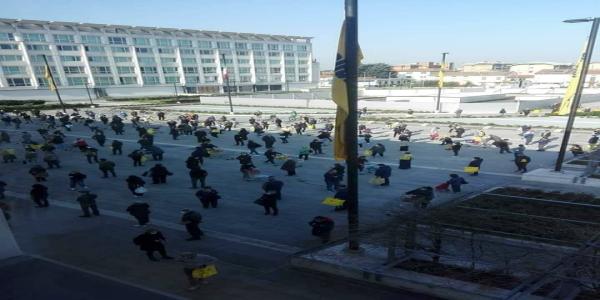
That unjustified panic is already (almost) passed, but the confusion I reported earlier about “essential goods” remains:
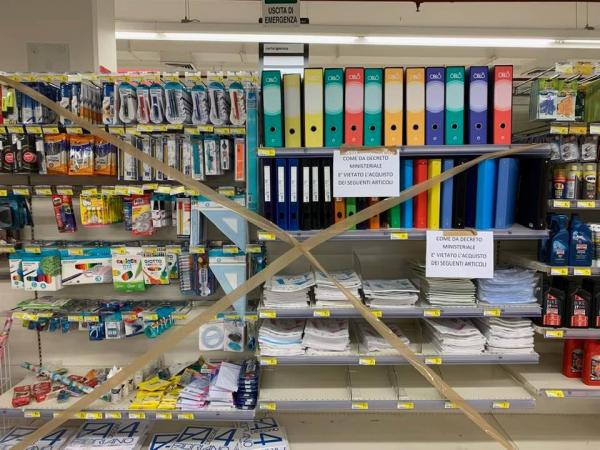
No school supplies for you!
</em></u>
Some supermarkets announced special flash sales with big discounts. They did it in good faith to help jobless people, but it’s still stupid. If you want to help, lower prices period, rather than making people come all at the same moment.
Sales or not, supermarkets staffs keep calm, look weird and carry on. Thanks to you too, people:
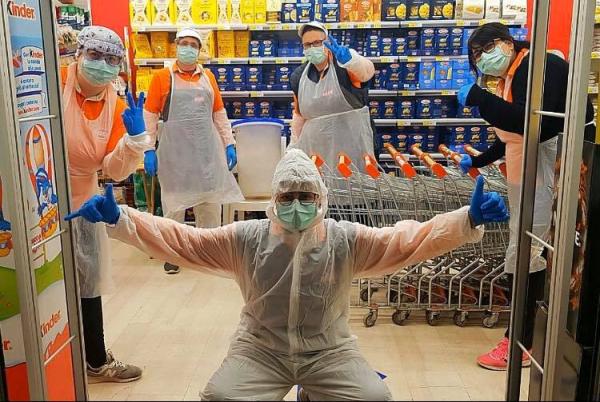
Outside, riders ride more than before to deliver food and medicines, in eight hours shifts and nowhere to go when nature calls, or it’s lunch time. Except in Bergamo and Brescia, where hospital supplies come by Carabinieri, because couriers refuse to go there.
Overworked pets and majors, and respect of rules: Some dogs and city majors are worn out. The former, from being used as excuse to go out by every member of their family, several times per day. The latter, by yelling to the few, still too many idiots strolling around. Check the captions in the picture below, or in this epic compilation on Twitter to see what I mean.
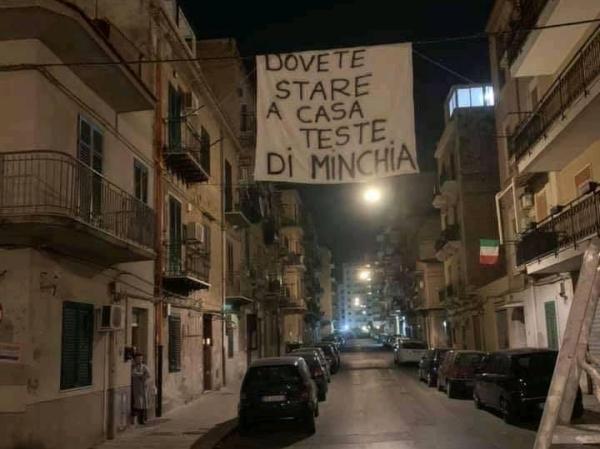
Translation: stay home already, you d**kheads
</em></u>
Luckily, the percentage of italians that the police finds in the streets for valid reasons (rightmost column) seems to be extremely high:
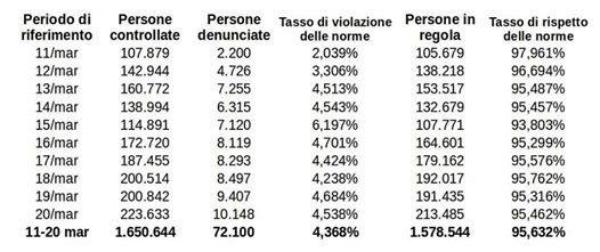
65%. This, instead, is the percentage of local Small and Medium Businesses now at risk of default.
Justice as usual. Big Tech style: last week I read lawyers panicking because “if we must stop, so must courts, least defendants be tried without their lawyers”. That should not happen. Trials will continue, via videoconferencing thanks to tools like Skype for Business and Microsoft Teams.
New best practices emerge to deal with domestic abuse. The Public Prosecutor of Trento has decided that, for the time being, he will not send anymore to “faraway, safe shelters” the victims of domestic abuse, but their abusers. Why increase the risks of contagion of the weakest?
“Love doesn’t stop”:
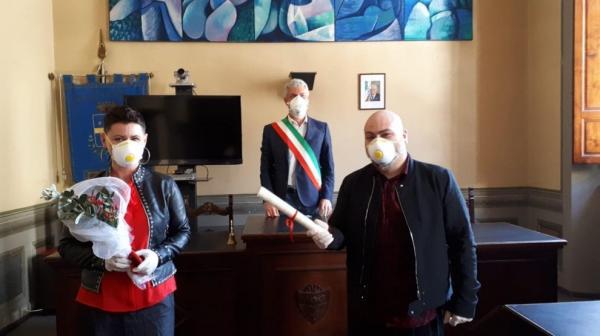
He could not kiss the bride, not on the spot anyway. But these newlyweds in Arezzo seem happy anyway.
Speaking of neverending love… reliable sources told me yesterday that one of my wife’s classmates had a mad crush for her in high school, is single and is now trying to reconnect with her. No problem. I immediately checked his most recent pictures on Facebook, and I aged quite better than him.
Newborns and seniors: Expecting mothers resort to private labs, at 200 Euros a pop, for exams that public hospitals are too overwhelmed to do. The official schedules for the monthly cash withdrawals of pensions now are spread over the whole month not just a few days.
Hard times for smokers and gambling addicts: Sorry, but at this point “tabaccai” must close, say many majors. Tabaccai are the stores that sell smoking products and, among other things, weekly lottery tickets. Both good sources of tax revenues. Even online gambling is restricted, presumably to save people locked at home from going broke even faster.
Movie theaters, beware! Italians are discovering at least five ways to watch and comment streamed movies together, while being each in their home. Fear of closed crowded places and empty pockets will last much more than the outbreak, and so will part of this trend.
A decade of social distancing? A great article speculates that after COVID19 the whole world may switch to stuff like larger meeting rooms with more spaced seats, or scheduled accesses to gyms, so they are never too crowded. I don’t know. What I do know is that even next winter, one sneeze or cough in public will be enough to make everybody step away from you. A major worry of mine is another outbreak next autumn.
Hack snorkeling, beat COVID19: 3d printing and twenty Euros masks have become ventilator masks for 500 patients in Northern Italy:
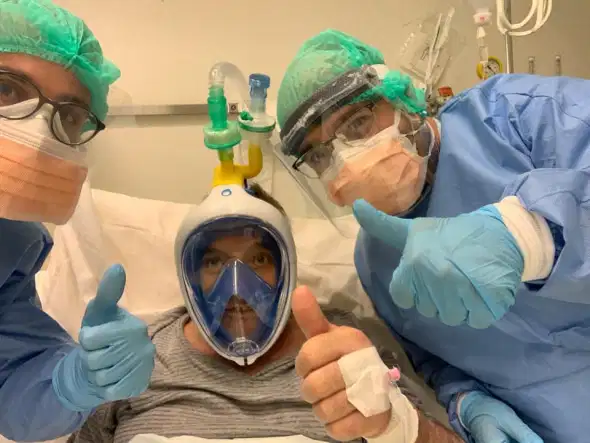
Call centers? Same Old, Same Bad. The operators of most (not all!) call centers are as essentials as riders, these days. So the majority has been kept working in their crowded open spaces, maskless and sharing microphones across shifts. One of them, tested positive, died in Rome Sunday. 34 years old. The day before, another big call center in Piedmont had been closed after 4 workers tested positive. The 250 coworkers who came close to them are now being tested.
Comics! Sergio Bonelli Editore, maybe the biggest comics publisher in Italy, and arguably also the least digital so far, is making 14 comics books freely available on its website. Mondadori, a major book publisher, also released many ebooks for free.

Education
As always happens in the real world, the real issues before lack of technology are regulations and people’s objective limits.
It seems very likely that schools and Universities will not reopen before early May, and many articles like this or this spend thousands of words debating the consequences. Here are the main open issues on this front, mixed with reactions from parents and teachers I saw on social media.
- Students will learn less this year, no matter what we do
- Can teachers grade homework assigned via distance lessons? Must they? How? Some rules will have to change to make it legal, but even then, how do you evaluate (even if you had a full platform already working…) if someone’s poor results are due to lack of bandwidth, lack of “one laptop per child” in the same household, or lack of commitment? How do you distinguish absences for serious reasons from GTA sessions that could not be stopped?
- Calling it quits, and promoting everybody to the next grade, cannot be excluded
- High school final exams are another issue, because the corresponding score decides which Universities one can attend, here or abroad, or who gets public jobs first. They may take place online, with much simpler procedures, and reduced programs. Same general approach for university exams and thesis discussions
Distance learning? Not in primary school!
- “Scores of teacher messages, every morning”
- “Now our children will find out how dumb we parents are. It’s not right”
- “If we don’t die of Corona, we’ll die of Distance Learning”
These are just the main points of a spectacular outburst from a mother of four. She is not Italian, but says the very same things I hear from parents in primary schools here.
Data confusion
The italian death rate is so high also because it includes both the “dead of COVID19” (that is, with no other disease) and the “dead with COVID19”, meaning patients with late-stages diabetes, kidney failure, whatever… that were worsened by the virus. To further complicate things, it seems, as far as I know, that nobody has still compared deaths now with those of the last 3 / 4 years, to find what actual difference COVID19 is making.
This makes comparisons of Italy with other countries harder, and headlines harder and more sensational, which is surely not good (except for advertisers). More clarity on this issue is also essential for virologists looking for a vaccine: we cannot fight pandemics without real Open Data, released with coherent criteria. Remember the confusion when the China death rates had a huge spike because they changed their counting methods?.
At the same time, I feel that this confusion has little or no impact, in practice, on the whole “flatten the curve” thing. Even if we concluded for sure that COVID19 is the only killer of only 1 out of 100 deaths “with” COVID19, and in the other 99 cases it “only” accelerated the journeys of folks who would have surely died anyway before Christmas, so what? The end result now is the same: unless you flatten the curve, hospitals will explode and many otherwise avoidable deaths will occur.
The big picture. Now and after
Many other countries are going into some lockdown now, but being ahead as it is Italy remains the testbed that first releases certain data and insights on post-COVID19 western societies. Not that I am happy about it, but what can we excerpt for the future?
What do China, Russia and Cuba have in common?
This is easy: they are three countries alll hit by US sanctions that, besides being relatively immune to COVID19 recessions for the same reason, are all sending help to Italy, and unsuprisingly making a big PR move of it:
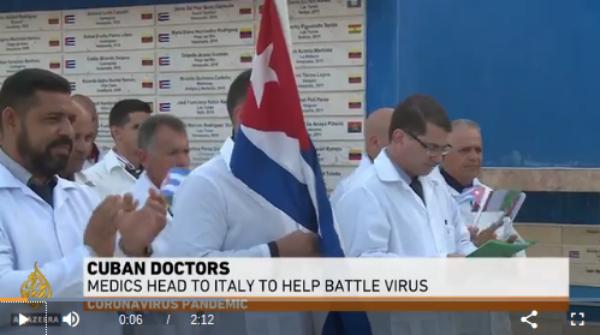
<u><em><strong>CAPTION:</strong>
<a href="https://www.aljazeera.com/news/2020/03/cuban-doctors-head-italy-fight-coronavirus-200322135301675.html" target="_blank">Parade of Cuban doctors heading to Italy</a>
</em></u>
Russia sent 8 medical teams and 9 IL-76 planes worth of medical equipment, and then more planes:
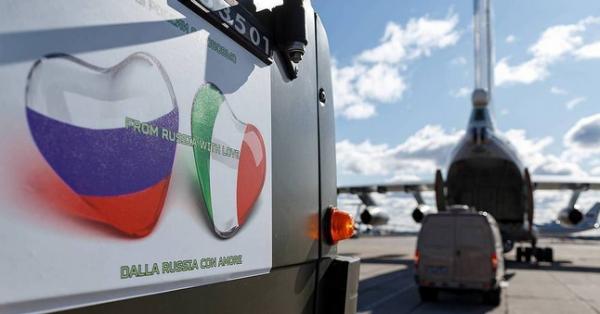
From Russia with love, 2020 edition
</em></u>
Help is coming from the US too but gets, or seeks, much less exposure. Maybe we are all marxists, or maybe they don’t want their president to know. I only discovered by chance that the Foundation Eli Lilly will donate one million Euros worth of Insulin to italian hospitals, or that a USAF Patient Staging System just arrived to Aviano.
Europe? Still a mix of sad and heart-warming news. The Czech Republic sequestered a big load of masks sent from China to Italy. Germany has taken in some COVID19 patients from Lombardy.
The Great Chinese Conspiracy
This paragraph is just one, unscientific “sentiment report” of one quarrel I watched unfold on Facebook. Make of it what you will.
One faction said we are complete fools to not hate China, and not demand HUGE compensation. They allowed thousands of Wuhan expatriates visiting home for the New Year to return here, while they were still covering the outbreak. And now they take advantage of the consequences to play the saviours and increase their power here.
The other side (including me) pointed out that yes, China is guilty of the initial cover-up. But China already holds trillions of US debt, an increasing control of Africa, strong influence on universities worldwide, even in the US. Why would it need to mess with pandemics that may backfire on them next autumn? Especially in a country that had already signed to join the New Belt Road. Not to mention the fact that chinese communities in Italy were first told to stay put and self-quarantine from Peking, NOT Rome.
Containment strategies
Lockdown, or Download? that is: “should we doing the South Korea thing, or not”? The italian government is now exploring that road. For what it’s worth, my humble gut feeling is that SK-style monitoring works as expected only in two cases:
- everything was already, really ready before the outbreak started, or
- everything is seriously locked down, or stays locked down, until you implement the monitoring. But you switch to it only when the lockdown has flattened the curve
Of course, if I am right, the second path is the only viable at this point for Italy. And for most other countries. But…
COVID Analytica
Health or privacy, and human rights in general? Here is a small, but I think meaningful, set of real quotes from friends, social media and other sources:
- Both EU basic rules and the italian Constitution and laws forbid blanket monitoring as in South Korea
- Democracy and privacy are non-negotiable, but unnecessary inside a coffin
- After the blow to liberty “because security” 9/11, here comes the one “because safety”
- the right to health must not cancel other rights, there are (at least) ten reasons why it’s right to let smartphones monitor us
- “Really? Then turn off your f***ing phone and seal yourself at home already”
- Just allow the police to beat/arrest/fine at will whoever breaks the lockdown, until it’s over. When they f**k us in those ways, it’s easy to be sure that they stopped doing it. But if they exploit this crisis to start China-like surveillance, we’ll never be sure if they are still doing it or not.
- Forget China! Don’t you know that Metabiota (a firm fighting COVID19 with Machine Learning) is controlled by the CIA through the In-Q-Tel venture capital fund?
Smart Working, and ICT booms
This mess is showing that remote working is not just an excuse to work less, and will surely be also a boom for businesses. The ones, that is, that will prosper by finding and patching all the backdoors, bugs and what not introduced by “telecommute now, security be damned”.
Unskilled workers. Or NECESSARY workers?
David Graber’s explanation of how to recognize bulls**t jobs sounds more relevant than ever: “If we suddenly eliminated teachers or garbage collectors or construction workers or law enforcement or whatever, it would really matter. We’d notice the absence. But if bullshit jobs go away, we’re no worse off”.
Makes one think, doesn’t it? Especially now that we risk an amazonification of the planet.
Unflatten this
Flattening the curve is all the rage now, but which curve? Or curves? This one seen on Twitter, for example, plots over time the number of people who may go on rent strike, versus the “State’s capacity to punish them”:
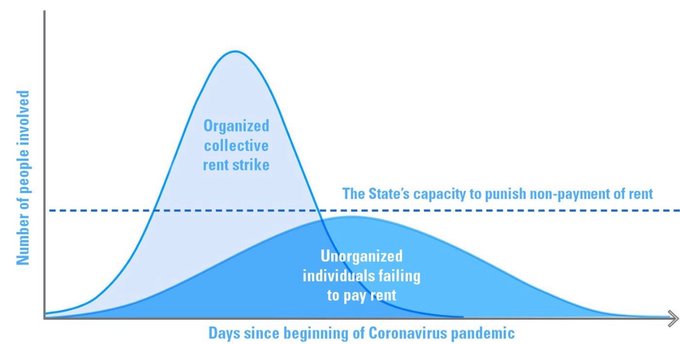
Italy had 1.8 million families in “absolute poverty” BEFORE this lockdown. The rest of the world of 2019 was not, in general, a haven of social peace. COVID19 is only accelerating the steepness, and criticality, of curves that need flattening. Regardless of pandemics: “The best we can hope for is that the depth of this crisis will finally force countries to fix the yawning social inequities that make large swaths of their populations so intensely vulnerable (source)".
Where is the free market? And money?
Italian politicians and media have spent much of the last 2/3 years to promote or attack something that (good or bad is another matter) was Universal Basic Income (UBI) in name only. Now they are debating everything, except requests of REAL UBI, because it’s now or never”.
I see an outbreak of bailout requests for companies, including those already dying before COVID19. Here is Alitalia, elsewhere is oil companies. I am confused. Aren’t we in a free market? If a company is failing, let it fail and just rescue its employees, so they can not only survive, but freely support, with their own wallets, any other businesses that could arise from the ashes. Not just in Italy, of course. Naive? Frankly, real UBI seems less utopic, and immensely simpler to implement and enforce, than most grand plans I see around these days.
Make Family Great Again
If periodic outbreaks like this become the new normal, says the MIT article I already quoted,
“Social distancing and school closures would need to be in force some two-thirds of the time - roughly two months on and one month off—until a vaccine is available, which will take at least 18 months (if it works at all)"
Here is how this sentence sounds to me: governments better change laws, fiscal policies and so on, as soon as possible, so that families can (return to) take care of their kids or elders, and support neighbor families… even if only ONE parent is working.
Final message
To know more about the nature and general meaning of Italy in lockdown, read the other posts below. To support them, and my other efforts to promote appropriate technology for the common good, see here. And in these difficult times, listen carefully to advice like this:
- “This will not be the pandemic that takes us all down, let’s make it the one that helps prepare us for and prevent the one that could" Lonny Grafman, Appropedia
- COVID19 is an equal opportunity infector
My previous posts on COVID19 in Italy, and the post-COVID19 world
- 03/02: How to take advantage of Coronavirus
- 03/09: Coronavirus is a DIGITAL issue
- 03/11: Coronavirus in Italy, and what it should mean for EVERYBODY, with a request
- 03/11: Coronavirus in Italy, more lockdown
- 03/16: Coronavirus in Italy, another snapshot of YOUR future
- 03/20: Life, the Universe and Everything look closer from #italylockdown
Who writes this, why, and how to help
I am Marco Fioretti, tech writer and aspiring polymath doing human-digital research and popularization.
I do it because YOUR civil rights and the quality of YOUR life depend every year more on how software is used AROUND you.
To this end, I have already shared more than a million words on this blog, without any paywall or user tracking, and am sharing the next million through a newsletter, also without any paywall.
The more direct support I get, the more I can continue to inform for free parents, teachers, decision makers, and everybody else who should know more stuff like this. You can support me with paid subscriptions to my newsletter, donations via PayPal (mfioretti@nexaima.net) or LiberaPay, or in any of the other ways listed here.THANKS for your support!